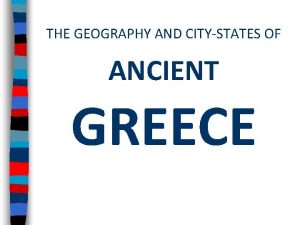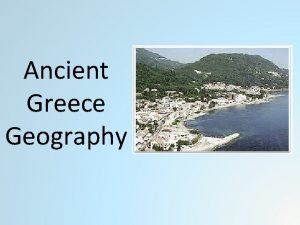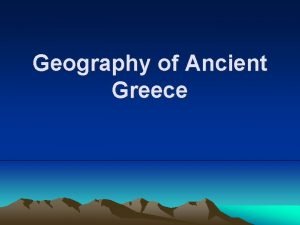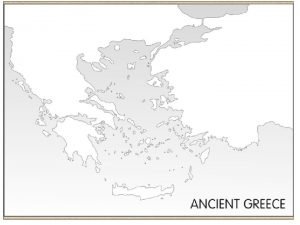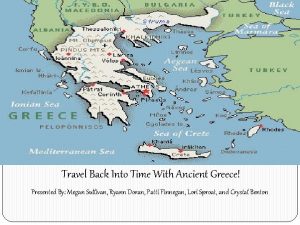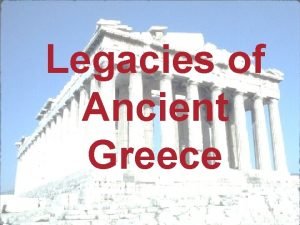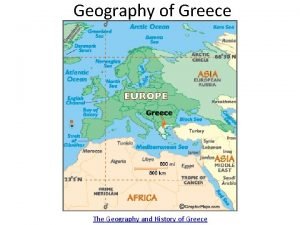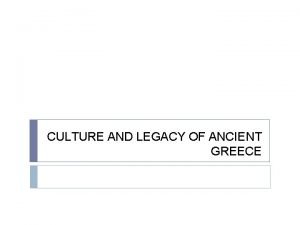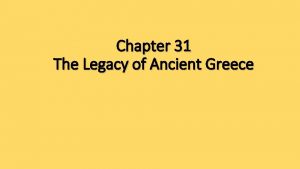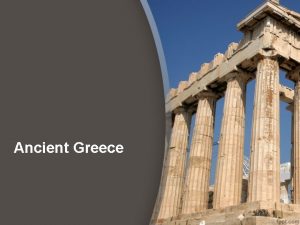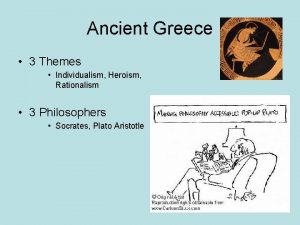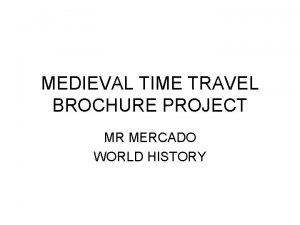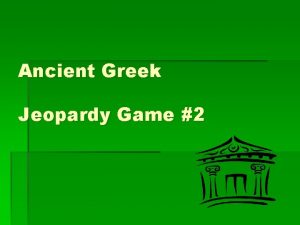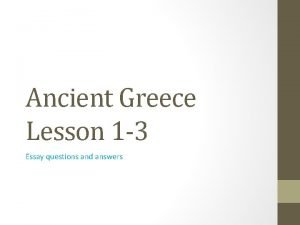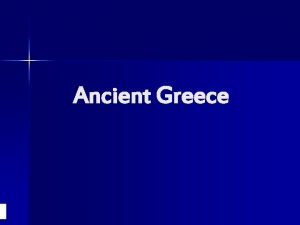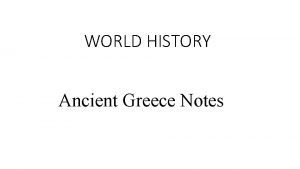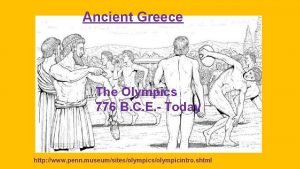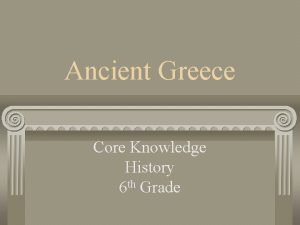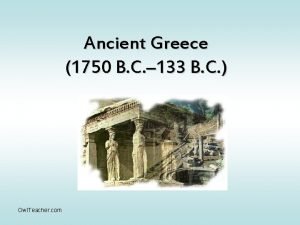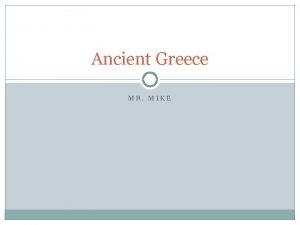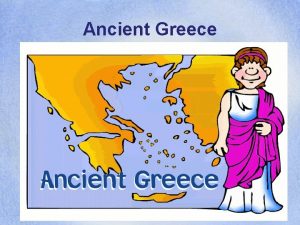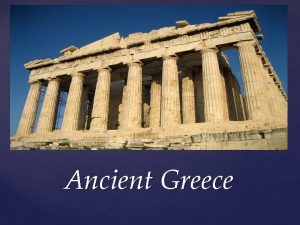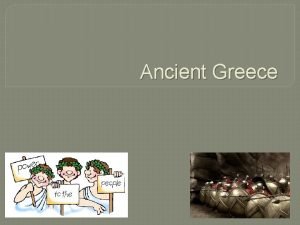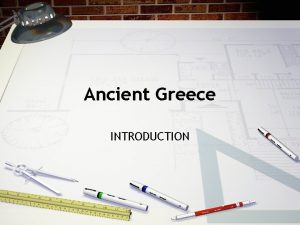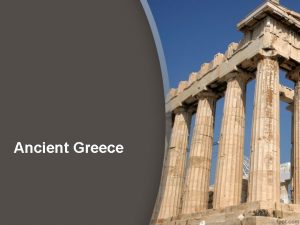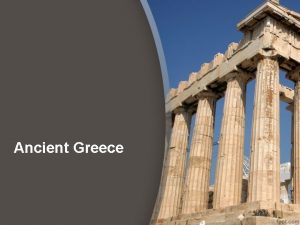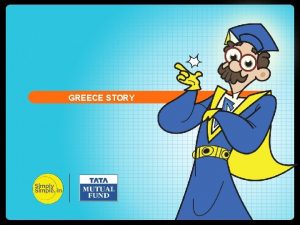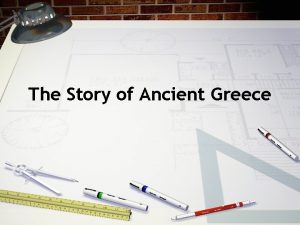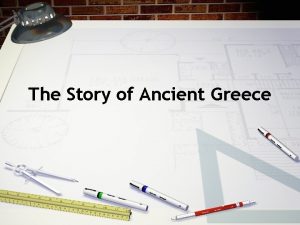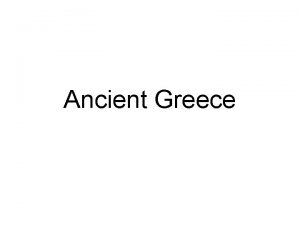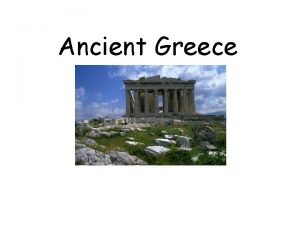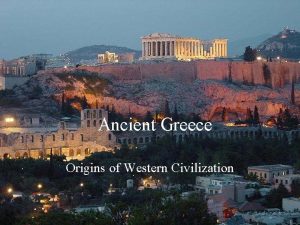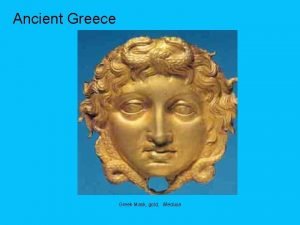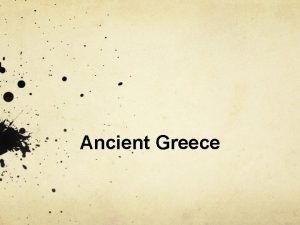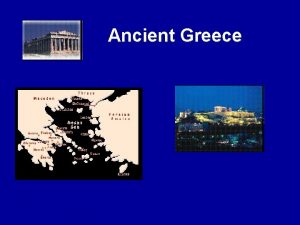The Story of Ancient Greece Geography of Greece





























- Slides: 29

The Story of Ancient Greece

Geography of Greece • Greece is a small country in Europe. • Greece is near the Mediterranean Sea. • The main part of Greece in on a peninsula. • A peninsula is a body of land surrounded by water on three sides. • The rest of Greece is made up of islands.

Who were the ancient Greeks? • Earliest Greek civilisations thrived nearly 4000 years ago. • Ancient Greeks lived in Greece and the countries we now call Bulgaria and Turkey. (See Google Maps) • Ancient Greece empire spread over Europe. Most powerful between 2000 BC and 146 BC. • Ancient Greece was split into many different states, each one was ruled in its own way. Each state had its own laws, government and money but they shared the same language and religion. Two most important states were Athens and Sparta.

Greek City-States • As Greece is made up of many islands, and has many tall mountains, the Greeks began to build city-states instead of one country. 2 most important states were Athens and Sparta • A city-state is a city with its own laws, rulers, and money. • City-states were cities that acted like countries. They shared same religion and language.


How were they resourceful and ingenious? • Very little arable land or resources – The Greeks traded wine and olives for the timber needed for ships • Soil by the sea was not so rich as on the plains – The Greeks used irrigation and crop rotation to keep the soil relatively fertile.

Sparta • Sparta was a Greek city-state. • Sparta was very powerful and had its own army. • Sparta conquered other city-states to gain wealth and power. • There were three classes of people in Sparta. • Citizens, non-citizens, and slaves.

Sparta’s Classes • Only men born in Sparta were citizens. • Women were not allowed to become citizens, however, women were allowed to own land businesses, which gave them more freedom than other Greek city-states. • The second class in Sparta was people who came from other city-states or other countries. They could own businesses but not become citizens. • The third class was slaves.

Sparta warriors • Learning to read and write in Sparta was not very important. • Training to become a good soldiers was important. • Young boys were taken from their parents and trained to be soldiers as well as good in sports such as running. • Girls were also trained to be good in sports.

Spartan Warrior

Athens • Athens was another important Greek citystate. • The people of Athens wanted to rule themselves and not have a king or queen. • Athens became the world’s first democracy around 508 B. C. • A democracy is a government in which all citizens can vote and have equal say in what happens.

Democracy in Athens • Athens was a democracy because all citizens could vote, but only half the people in Athens were citizens. • Women, people born outside of Athens, and slaves could not vote.

Ancient Greek Dressing

Pericles • Pericles was the leader of creating democracy in Athens. • He had many buildings constructed. • Pericles had the Parthenon and the Acropolis built.

Parthenon and Acropolis

Education in Athens • Education was very important in Athens. • Boys went to school to learn to read and write. They also learned many sports. • Girls were not allowed to go to school or learn to play sports.

The Greek Alphabet • The Greeks borrowed their alphabet from the Phoenicians. • Most European languages, including English borrowed ideas from the Greek alphabet.


Socrates • Socrates was a philosopher of Ancient Greece. • A philosopher is someone who tries to explain the nature of life. • Socrates taught by by asking questions. This method of questioning is still called the Socratic method.

Plato • Plato was a student of Socrates. • He started a school called The Academy. • Plato’s writing took the form of a dialogue between teacher and student.

Aristotle • Aristotle was another Greek philosopher and student of Plato. • He wrote about science, art, law, poetry, and government.

Alexander the Great • Alexander the Great was the son of King Phillip II of Macedonia. • Alexander conquered Persia, Egypt, the Middle East and Northern India. • He died at age 33 from malaria.

Alexander’s Empire

Achievement 1 • Describe it The Olympics Ancient Greeks began the tradition of hosting Olympic Games in 776 B. C. Dedicated to the gods of Olympus, the games featured the best and brightest athletes of all the cities in Greece. The games took place every fourth year and were a time of religious, political and democratic togetherness.

How has it influenced our lives today? Now, the Olympics are held in different countries every time. Also, in modern times, there are winter and summer Olympics which each occur every 4 years.

Achievement 2 • Describe it Marathon The Greek armies were outnumbered when the Persian army attacked. They relied on local runner Pheidippides who ran 450 km to seek help and warn local leaders of impending attacks. He died as he finished his last 41. 8 km trek from Marathon to Athens.

How has it influenced our lives today? Now, more than 500 marathons are held throughout the world each year

Video

Useful Links • https: //www. youtube. com/watch? v=Lrb. Hj. Ck_ZYg • http: //classroom. synonym. com/10 -things-inventedgreece-use-today-21456. html • http: //www. primaryhomeworkhelp. co. uk/greece/fa mous. htm • www. mrkash. com/activities/greece. ppt
 Greece geography
Greece geography Ancient greece map
Ancient greece map Map of sparta greece
Map of sparta greece Describe the geography of ancient greece
Describe the geography of ancient greece About 80 percent of the geography of greece is
About 80 percent of the geography of greece is Ancient greece blank map
Ancient greece blank map Where was ancient greece located
Where was ancient greece located The legacy of ancient greece chapter 31 answers
The legacy of ancient greece chapter 31 answers Explain physical education in sparta
Explain physical education in sparta Legacies of greece
Legacies of greece Aegean peninsula
Aegean peninsula Ancient greece stations
Ancient greece stations The legacy of ancient greece
The legacy of ancient greece Ancient greece music instruments
Ancient greece music instruments Cultural values of ancient greece
Cultural values of ancient greece Which continent is greece located in
Which continent is greece located in Map of ancient greece balkan peninsula
Map of ancient greece balkan peninsula Balkan peninsula ancient greece map
Balkan peninsula ancient greece map Balkan peninsula ancient greece map
Balkan peninsula ancient greece map Individualism in the school of athens
Individualism in the school of athens Aristotle direct democracy
Aristotle direct democracy Greece travel brochure project
Greece travel brochure project Ancient greece jeopardy
Ancient greece jeopardy Ancient greece essay topics
Ancient greece essay topics Is greece a peninsula
Is greece a peninsula Greek map
Greek map What did greek actors wear
What did greek actors wear 776 b.c.e
776 b.c.e Core knowledge ancient greece
Core knowledge ancient greece Ancient greece 1750 b.c-133 b.c answers
Ancient greece 1750 b.c-133 b.c answers
